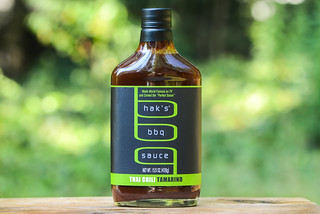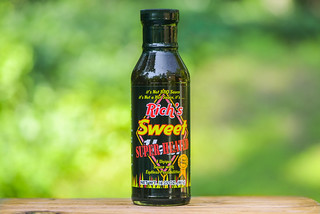Bachan's Japanese Barbecue Sauce Hot and Spicy

Background
Justin Gill lovingly and aptly named his company Bachan—grandmother in Japanese—after the matriarch who taught him the family barbecue sauce recipe. Like many barbecue sauce origin stories, Justin's grandma and family made large batches of their sauce and handed it out to friends, family, and customers, which garnered them some notoriety in their close circles. Before launching the brand in 2019, Justin spent six years perfecting the sauce, which seems to be time well spent because the brand grew rapidly after launching and in just six years you can already find his sauce in groceries all across the United States and in seven different varieties.
Aroma
The strong savory scent of soy sauce is unmistakable as the dominant trait in the aroma. Some additional sugar brings out the caramel-like character of this fermented sauce. Deeper whiffs release a mellow vinegar tang along with notes of ginger, garlic, and a slight fruity jalapeño, which doesn't come off as spicy in the aroma alone.
Thickness & Texture
This deeply dark brown sauce has a glossy sheen to it and is pretty opaque thanks to its dark hue. I couldn't see any spices in this sauce at all, even when help up to bright sunlight. The consistency of this sauce is very thin and watery, which has it flowing from a suspended spoon in a fast and even stream that leaves only a thin coating left clinging to the silverware.
Out of the Jar
There's a fleeting initial sweetness to this sauce that gets drowned out by the strong salty stamp of soy sauce along with a medium vinegar tang. Those flavors grow harsher as the sauce settles on the tongue, but it's not so intense that tastes of ginger, garlic, and onion get completely masked. After a few seconds more, right before the sauce starts to make its exit, is when a mild heat enters with a fruity stamp that hints at jalapeño, but it's not easy to peg the exact pepper, or peppers, at work here. The savoriness gets dialed up to eleven on the sauce's final exit which is paired with an enhanced heat and tanginess, creating a very strong aftertaste.
Slathered & Cooked
This sauce brushed on the chicken in a very thin layer and a lot of sauce slid off the leg at first. However, what stuck set quite well and that created a sticky layer for additional brushing to cling to, generating a decent sauce layer after the third basting. Over direct heat, the sauce darkened in spots, but didn't burn, providing an even more attractive exterior, especially given that no sauce burned away, There was a slight bump in the sweetness after being cooked, but the main story remained the salty and savory soy sauce. That meant there was a ton of flavor from bite one, but it also resulted in a somewhat overwhelmingly salty profile by the time the leg was done being consumed.
Put to Use
A long time ago I was given an assignment at Serious Eats to work on a tare sauce recipe. The base of these sauces are almost always soy sauce, mirin, and sake, but from there each chef puts their own stamp on the flavor profile. I personally crafted mine with an eye on balancing out the extreme saltiness with brown sugar and added a good amount of white pepper for a distinct bite that melded well the scallion, ginger, and garlic accompaniments. Since crafting that recipe, it's been the only Japanese-style barbecue sauce I've used, and that might be why I've shied away from ever trying Bachan's even though I've been seeing it in groceries by me for a few years now. That all goes to say that I may be a little more biased here because, for my personal tastes, this incarnation of Japanese barbecue sauce was a tad too salty. After getting that out of the way though, I can say this is truly a well crafted sauce and you can taste the focus on quality ingredients and the unique flavor profile given by Justin's choice of components. The heat added a nice extra taste, but didn't stand out and doesn't render the sauce too spicy for most folks. I was worried the sauce might be a little too thin to work well, but I was proven wrong on that after the leg picked up a great appearance and ton of flavor with the amount of brushings I would use for any standard barbecue sauce. Knowing how this sauce flavor skews now, I'm looking forward to trying out the sweeter recipes, which may be more in line with my palate, but anyone looking to give their chicken, pork, or veggies that distinct Japanese barbecue flavor will be pretty well served by this sauce.




